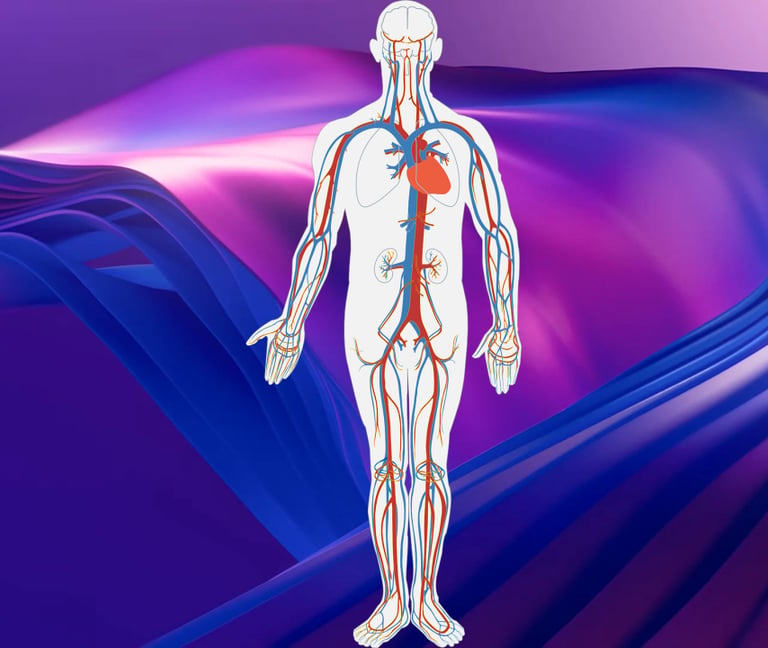Understanding the Human Body: Main Organs and Systems for Optimal Health
Divine & Genuine
8/5/20244 min read


WHAT IS IT?
The human body is a complex and well-organized system of various parts working together to sustain life and support bodily functions. It is composed of numerous cells, tissues, and organs that perform specific functions essential for survival and overall well-being.
Important Organs and Systems of the Body
1) The circulatory system
The circulatory system, also called the cardiovascular system, is accountable for carrying blood, nutrients, oxygen, carbon dioxide, and hormones all over the body.
Essential Components:
. Heart: Propels blood throughout the body.
. Blood Vessels (Arteries, Veins, Capillaries): Intricate network for blood circulation.
. Blood: Conveys oxygen, nutrients, and metabolic byproducts.
Roles:
. Supplies cells with oxygen and nutrients.
. Eliminates waste products.
. Manages body temperature and pH balance.
Precautionary Measures:
. Maintain a nutritious diet with low saturated fats and cholesterol.
. Engage in moderate regular physical activity.
. Avoid smoking and excessive alcohol intake.
. Monitor and manage blood pressure and cholesterol levels.
2) The respiratory system
The respiratory system functions by taking in oxygen and expelling carbon dioxide.
Key Organs:
. Lungs: Primary respiratory organs.
. Trachea: Tube that carries air to the lungs.
. Bronchi and Bronchioles: Air passages that divide from the trachea into the lungs.
Roles:
. Supplies oxygen to the blood.
. Eliminates carbon dioxide from the blood.
Precautionary Measures:
. Refrain from smoking and minimize exposure to pollutants.
. Engage in moderate regular physical activity to enhance lung capacity.
. Participate in deep breathing exercises.
3) Digestive System
The process of digestion involves breaking down food in the digestive system into nutrients the body can absorb and utilize for energy, growth, and repair.
Key Organs:
. Mouth: Initiates the digestive process by breaking down food particles.
. Esophagus: A tube linking the mouth and the stomach.
. Stomach: Produces acids and enzymes for digestion.
. Small Intestine: Absorbs nutrients from the food.
. Large Intestine: Absorbs water and forms waste.
. Liver: Generates bile to aid in fat digestion.
. Pancreas: Produces digestive enzymes and insulin.
Roles:
. Breaks down food into nutrients.
. Absorbs nutrients into the bloodstream.
. Eliminates waste.
Precautionary Measures:
. Consume a well-balanced diet including fiber, fruits, and vegetables.
. Maintain proper hydration.
. Limit consumption of processed and high-fat foods.
. Follow good hygiene practices to prevent infections.
4) Nervous System
The nervous system manages and synchronizes all deliberate and unconscious actions and communicates signals between different body parts.
Essential Components:
. Brain: Central command center of the body.
. Spinal Cord: Relays signals between the brain and the rest of the body.
. Nerves: Complex network of fibers that transmit signals to and from the brain.
Roles:
. Manages bodily movements and functions.
. Processes sensory input.
. Facilitates thought, learning, and memory.
Safety Tips:
. Utilize protective equipment (such as helmets and seat belts) to avoid injuries.
. Refrain from using drugs and consuming excessive alcohol.
. Participate in activities that stimulate the brain.
. Ensure adequate sleep and effectively manage stress.
5) Musculoskeletal System
The musculoskeletal system gives the body support, steadiness, and mobility.
Primary Components:
. Bones: Offer framework and safeguard internal organs.
. Muscles: Aid in movement.
. Joints: Permit flexibility and mobility.
. Tendons and Ligaments: Link muscles to bones and bones to bones.
Roles:
. Sustains the body.
. Shields internal organs.
. Permits motion.
Safety Recommendations:
. Participate in activities that help strengthen bones and muscles.
. Maintain proper posture.
. Ensure sufficient consumption of calcium and vitamin D.
. Avoid repetitive strain and overuse injuries.
6) Endocrine System
The endocrine system oversees bodily functions by releasing hormones.
Important Organs:
. Pituitary Gland: The "master gland," produces, stores, and releases hormones. It regulates numerous endocrine glands.
. Thyroid Gland: Manages metabolism.
.Adrenal Glands: Generate hormones such as adrenaline and cortisol.
. The Pancreas has two main functions: It produces enzymes that aid in digestion (exocrine function) and makes the hormone insulin that regulates blood sugar (endocrine function).
. Ovaries/testes: Perform various functions, including, the production of male and female gametes and sex hormones.
Roles:
. Manages growth, metabolism, and development.
. Handles the response to stress.
. Oversees reproductive processes.
Safety Tips:
. Maintain a well-rounded diet and engage in moderate regular physical activity.
. Manage stress through relaxation methods.
. Undergo routine medical check-ups to monitor hormone levels.
. Avoid contact with endocrine-disrupting chemicals.
7) Immune System
The immune system shields the body from infections and illnesses.
Key Components:
. White Blood Cells: Combat and eliminate harmful microorganisms.
. Lymph Nodes: Purify the body from harmful substances and waste products.
. Spleen: Cleanses the blood and aids in fighting infections.
. Thymus: Generates and train T-cells for immune defense.
. Bone Marrow: Produces blood cells.
Functions:
. Defends against pathogens.
. Eliminates toxins and dead cells.
Protection Tips:
. Maintain a nutritious diet abundant in fruits and vegetables.
. Engage in moderate regular physical activity and ensure sufficient rest.
. Adopt good hygiene practices.
. Avoid stress and tobacco use.
8) Urinary System
The urinary system eliminates waste materials from the bloodstream and manages the balance of fluids and electrolytes in the body.
Key Organs:
. Kidneys: Purify the blood to create urine.
. Ureters: Carry urine from the kidneys to the bladder.
. Bladder: Collects and temporarily stores urine before releasing it during urination.
. Urethra: Carries urine from the bladder to the outside of the body.
Functions:
. Eliminates waste and harmful substances from the body.
. Regulates the balance of water and electrolytes.
. Manages acid-base equilibrium.
Protection Tips:
. Consume an adequate amount of water.
. Maintain good cleanliness.
. Reduce intake of excessive salt and caffeine.
. Undergo regular check-ups to monitor kidney function.
9) Reproductive System
The reproductive system is tasked with creating offspring and upholding sexual function.
Crucial Organs (Male):
. Testes: Generate and store sperm. Produce testosterone.
. Penis: Transports sperm to the female reproductive system.
Crucial Organs (Female):
. Ovaries: Generate eggs and hormones.
. Uterus: Nurtures fetal development.
. Vagina: Birth canal and location for sperm reception.
Functions:
. Generates gametes (sperm and eggs).
. Facilitates reproduction.
. Produces sex hormones.
Tips for Protection:
. Engage in safe sexual practices to prevent sexually transmitted infections.
. Undergo regular medical check-ups.
. Sustain a healthy lifestyle.
. Avoid harmful substances and stress.
10) Integumentary System
The integumentary system is the outer layer of the body. It shields the body from external harm, controls temperature, and offers sensory feedback.
Primary Components:
. Skin: Acts as a barrier against pathogens and injury.
. Hair and Nails: Protect and bolster the skin.
. Glands (Sweat and Sebaceous): Control temperature and hydrate the skin.
Roles:
. Safeguards internal tissues and organs.
. Regulates body temperature.
. Supplies sensory feedback.
Safety Tips:
. Apply sunscreen for protection from UV rays if needed.
. Maintain proper hygiene.
. Keep skin hydrated and moisturized.
. Minimize exposure to harsh chemicals.
Note: Understanding and protecting each of these organs and systems can help maintain optimal health and improve the quality and longevity of our lives.
DON’T FORGET TO SUBSCRIBE AND SHARE.
DISCLAIMER: Please be advised that the information provided here is for informational purposes only. It is not intended to be taken as medical advice or consultation. It is imperative that you consult your physician for any medical advice.
Quality
Providing top-notch health and wellness products and services.
Satisfaction
Gold
info@divineandgenuine.com
© 2024. All rights reserved.
